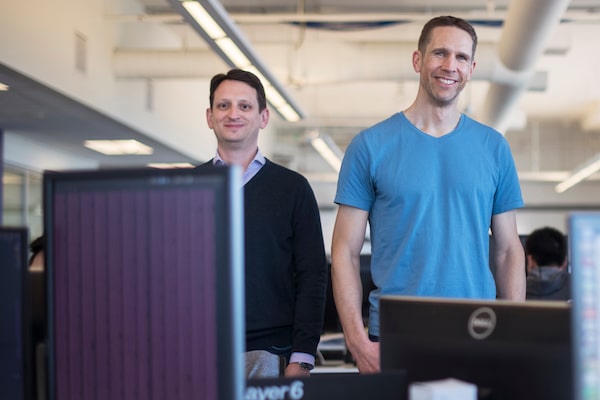
Radical, launched in 2019 by AI entrepreneurs Jordan Jacobs and Tomi Poutanen, continues to chart a distinct course for a Canadian venture capital firm. It has now raised most of a planned US$550-million fund.Fred Lum/The Globe and Mail
With interest in artificial intelligence exploding into the mainstream, Toronto’s Radical Ventures has raised more than US$350-million for its second fund focused on startups in the field and has added global luminaries as partners.
Radical, launched in 2019 by AI entrepreneurs Jordan Jacobs and Tomi Poutanen, continues to chart a distinct course for a Canadian venture capital firm. It has now raised most of a planned US$550-million fund, topping the US$325-million it raised for its first investment vehicle, which is exceptionally large for a Canadian VC firm’s first two funds. Radical also raised a US$100-million-plus special purpose fund in 2022 to double down on its winners.
It has attracted backers including Canada Pension Plan Investment Board and Public Sector Pension Investment Board, which don’t typically back domestic VC funds, Toronto-Dominion Bank TD-T, Singapore sovereign wealth fund Temasek, the billionaire Newhouse family’s Advance Publications Inc., and leading AI researchers Geoffrey Hinton of University of Toronto and Fei-Fei Li, co-director of Stanford University’s Human-Centered AI Institute. Unlike most Canadian VC firms, Radical hasn’t tapped government agencies such as the Business Development Bank of Canada or the federal Venture Capital Catalyst Initiative for funding.
“Normally we don’t invest in early-stage venture funds” until they have an established track record, said Leon Pedersen, CPPIB managing director and head of growth equity. “Radical was an exception. They are in a strong position because they were early to the party. Now they need to execute on that. I think they are doing the right things.”
Radical has also added two big names to its slate of partners: Dominic Barton, former Canadian ambassador to China and former global managing partner of McKinsey & Co., and London-based Aaron Rosenberg, head of strategy and operations at Google’s AI unit, DeepMind Technologies.
“He is the most connected person on Earth,” Mr. Jacobs said of Mr. Barton, a past adviser. “Is there one person that can make a call to get a startup in to see the CEO of a Fortune 500 company? It’s Dominic. That’s the role he plays with us.”
They join a partnership that includes John Megrue Jr., former co-chairman of hedge fund giant Bridgewater Associates, former TD chief executive Ed Clark, and Rob Toews, who helped craft AI policy for the Obama administration.
Radical has funded some of the most promising AI startups in Canada, including driverless car system developer Waabi Innovation Inc., natural language generator Cohere Inc. and chip maker Untether AI Corp., plus foreign startups such as Silicon Valley-based SuSea Inc., which aims to challenge Google with its You.com search assistant.
While AI has for years powered applications such as content recommendation engines and chatbots, interest has exploded recently. Ordinary people are enjoying AI advances more than ever after long-gestating services such as OpenAI’s text-generating AI tool ChatGPT and image-generating tool Dall-E became available to the public last year. Their uptake could prompt a boom in consumer AI services similar to how browsers popularized the internet in the 1990s.
Despite a tech-sector downturn, investor interest in AI “is off the charts,” Mr. Jacobs said. “Probably two-thirds of our portfolio will do significant uprounds” by July, meaning they will raise money at much higher valuations than prior financings.
Tech giants have responded by refocusing their investments. Despite announcing layoffs this month, Microsoft Corp. said it would invest up to US$10-billion in OpenAI. Alphabet Inc. chief executive Sundar Pichai similarly spoke of his company’s “substantial opportunity in AI” as he announced 12,000 layoffs at Google.
Mr. Jacobs and Mr. Poutanen have been pivotal players in establishing Toronto as an AI capital. After foreign tech giants snapped up local startups and top AI researchers last decade, they helped establish Toronto’s Vector Institute for Artificial Intelligence and write the government’s AI strategy.
Mr. Jacobs, a former entertainment lawyer, and Mr. Poutanen, who studied machine learning under Prof. Hinton, sold their AI startup Layer 6 to TD for US$100-million-plus in 2018. Mr Jacobs became head of business and strategy for AI while Mr. Poutanen served as chief AI officer for the bank.
The pair, who had invested in AI startups on their own for years, launched Radical in 2019, with Mr. Jacobs leaving the bank to lead the firm. Mr. Poutanen quit TD last year to start a company to develop AI tools for health care institutions.
Radical’s first fund backed 27 companies, about half located in Canada. Its new fund has already made seven investments. “Everyone says, ‘Oh, you’re in the right place at the right time,’” Mr. Jacobs said. “My answer is: ‘Yeah, it just took over a dozen years to be here.’ We’ve been in this lane the whole time. We understand this technology at a granular level in a way the average VC just does not.”
Mr. Jacobs predicted the next few years will bring a massive “software replacement cycle” in which programs are superseded by self-teaching AI that learns and improves the products. “ChatGPT is the very tip of the iceberg. We have been investing in the iceberg,” he said.
 Sean Silcoff
Sean Silcoff Josh O’Kane
Josh O’Kane